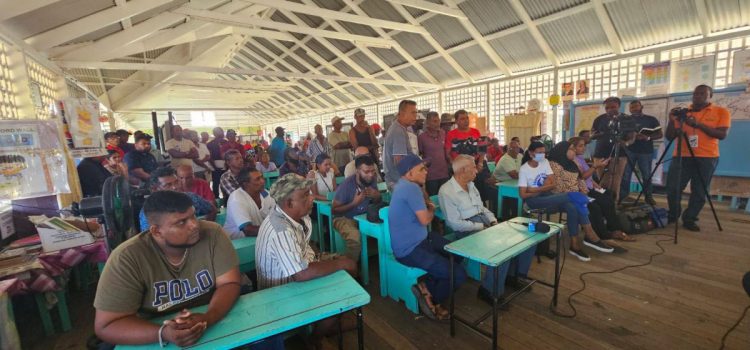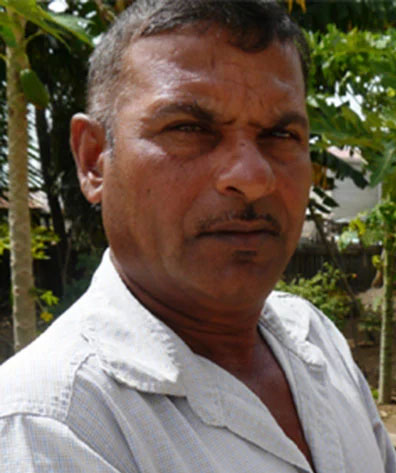Rice farmers on the Corentyne are reeling from the paddy bug infestation which has caused an average of 20% losses throughout the region leaving many farmers unsure of how they will return to the fields next crop.
According to the farmers, the Ministry of Agriculture through its extension services is carrying out daily monitoring of the situation. Heading the monitoring team in the region, farmer, Lekha Rambrich explained that while currently there is a decline in the paddy bug, damage has already been estimated to be an average of 20% across the region.

Several farmers within the Corentyne area are reporting over 70% of losses individually leaving the region with several million in losses.
According to Rambrich, usually, the paddy bugs would migrate to the front of the cultivation but instead, now they are migrating backward. He explained that the monitoring in Black Bush Polder and Nos 52/74 Backlands has resulted in them noticing the paddy bugs migrating backward to the savannah which he said is a new pattern.
Additionally, he said, that it is a situation where there is a swift migration of paddy bugs. “You notice the bugs now and by tomorrow you see no bugs you think to go spray and they swoop down and do the damage and gone.”
Furthermore, he said, they have noticed that the paddy bugs are laying eggs (nymphs) in large quantities. “The pattern is different and very difficult to control.”

He added, “It’s a severe impact on the farmers, it is difficult, farmers don’t know how they will go back into the field, they will definitely need help.”
Rambrich on Friday had to carry out aerial spraying on his plot in the hope of rescuing his crop and he stressed that the process is an expensive one. “It is a high cost, I had to cover the cost of the aircraft to come to Bath from where it was then to come spray but it’s a good service.”
While farmers can benefit from the aerial spraying, Rambrich told the Sunday Stabroek that he is unsure how many can afford to do the same currently. “It sprayed my plot which is 230 acres and this morning I see a significant reduction in the paddy bug, almost all gone.”
Subsidize
Meanwhile, according to him farmers had made representation for aerial spraying to be done and were hopeful that the government through the Ministry of Agriculture would have attempted to subsidize this process but this was not done.
He continued, “How much farmers go afford the aerial spraying? They (government) could have subsidized it, pay half and farmers would pay half, reach each other halfway, farmers have been calling for it, suggestions were put.”
Describing the situation as a “crisis” in the rice industry countrywide, Rambrich explained that to his knowledge the last time there was such an infestation was between 2002 – 2003 and even then he noted that the infestation now is much higher.
He added that then also, farmers were left to bear the losses with some not returning to planting the following crop.
“The region producing 67,000 acres at average, 35 plots per acre 20% of that will lost. Value to money, billions of dollars in losses due to paddy bug.”
“It started very, very low. First set of rice started to plough but then there was a drastic impact when about 2% start the flowering (then) we recognize the impact.”
He then opined that from the time of the initial report of the sighting of paddy bugs, there was adequate time to have measures implemented to assist farmers with the situation. “More than adequate time, over two months now it affecting the crop and farmers suffering from it.”
He said, “20% loss farmers are chasing (average within the region), I don’t see it possible for some farmers to go back into the field, financially they would not be able to bear the cost to go back.”
Earlier this month, Minister of Agriculture, Zulfikar Mustapha told farmers in the Upper Corentyne Area that the ministry was working aggressively to put systems in place to deal with the paddy bug infestation.
Mustapha had said that he had since met with all extension officers countrywide as they work to put systems in place. “We are trying as much as possible to put all the systems in place.”
Additionally, Mustapha said then that they were looking at the possibility of aerial spraying within the affected areas, “so we are trying to deal with it.”
According to farmers, the current paddy bug infestation is one of the largest in recent years, and Mustapha had said that they were trying their best to eradicate it hence the entire complement of technical workers was sent to the region to work to deal with it, noting that several issues are leading to the paddy bug infestation.
Meanwhile, technical staff when contacted by this newspaper have also described the paddy bug infestation to be one of the largest seen noting that they were placed on monitoring duties.
As of last week, individual farmers within Black Bush Polder, Nos 52/74, and Crabwood Creek were reporting between 30 – 80 adult paddy bugs and 10 – 50 nymphs daily.
The technical staff has also been carrying out educational outreaches with the farmers to inform them of the best possible mix to use to spray the bugs.
Corentyne rice farmer, Ramgolam Singh told the Sunday Stabroek that farmers are reporting losses of $500,000 from every 500 bags of paddy. “It’s very much alarming”, he said, while contending that the last time there was such a huge infestation was between 1997 – 1998.
“Farmers go every morning and afternoon in the field to prevent the paddy bug and spray but because of the amount of paddy bug in the system we lose a lot.”
He said that yesterday the Guyana Rice Development Board held a meeting with farmers to further discuss aerial spraying, however, he was unsure of how fruitful that might be now given that 80% of the crop has already been harvested.
Singh also added, that while there is an increase in yield this year, the country will suffer a “drastic reduction” in exports due to the infestation. “Countrywide will get less export, export will be less, they won’t get the amount of money like last year, the infestation was very, very severe.”
According to Singh, rice farmers are now in dire need of help for the next crop.






